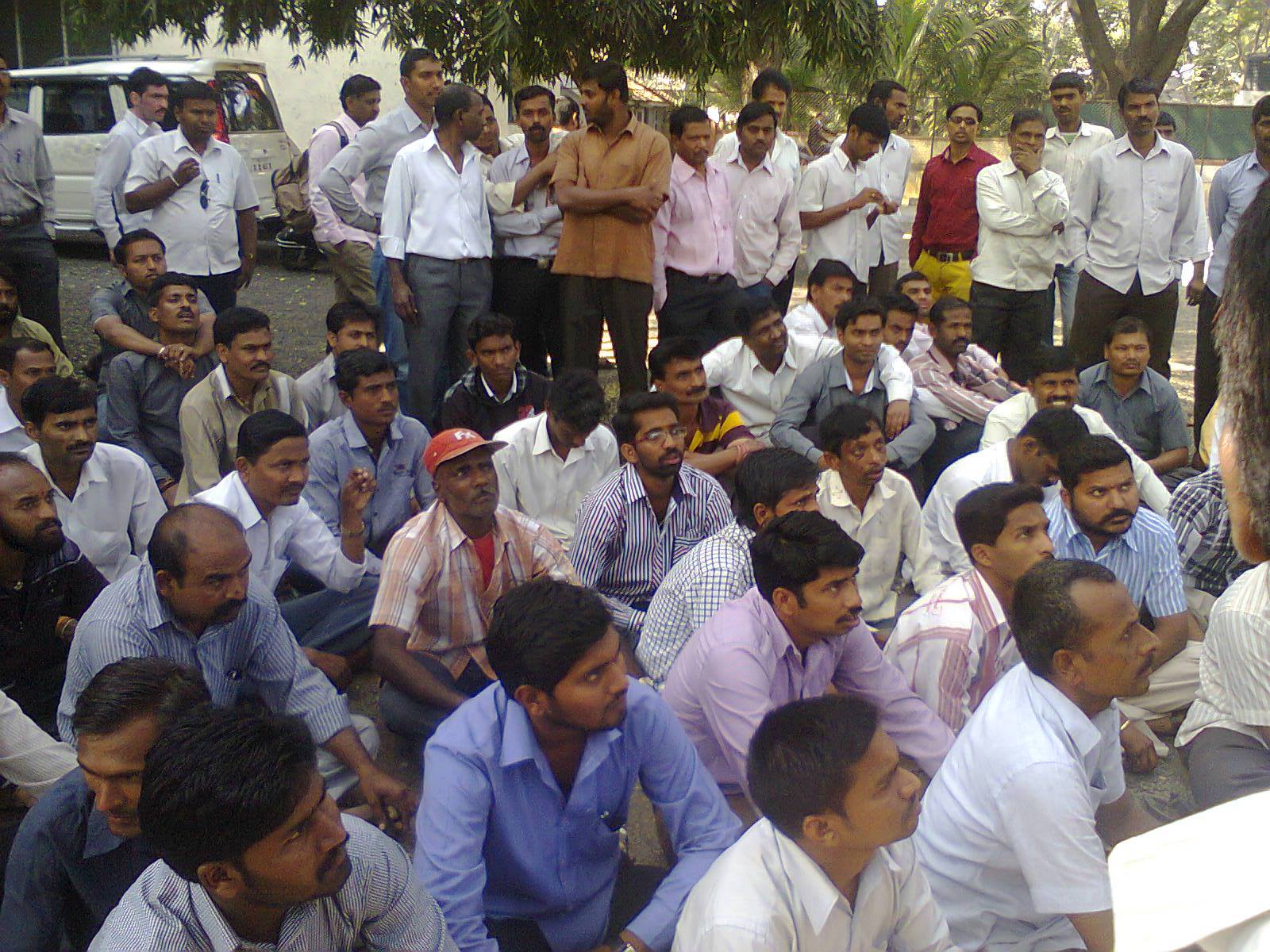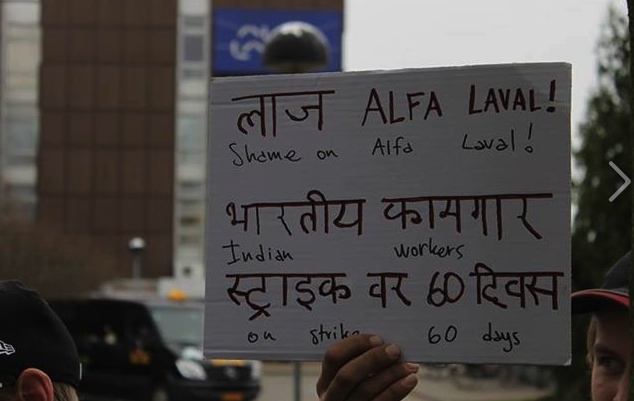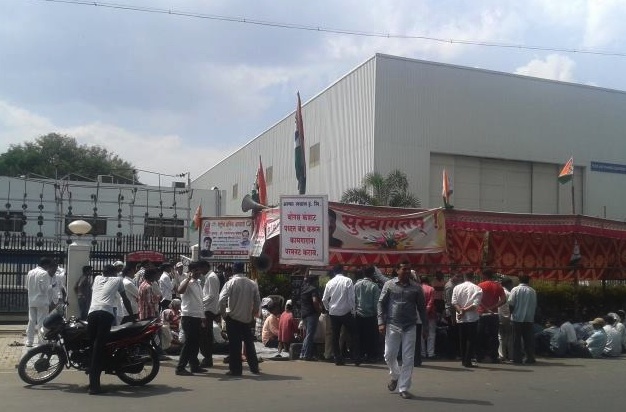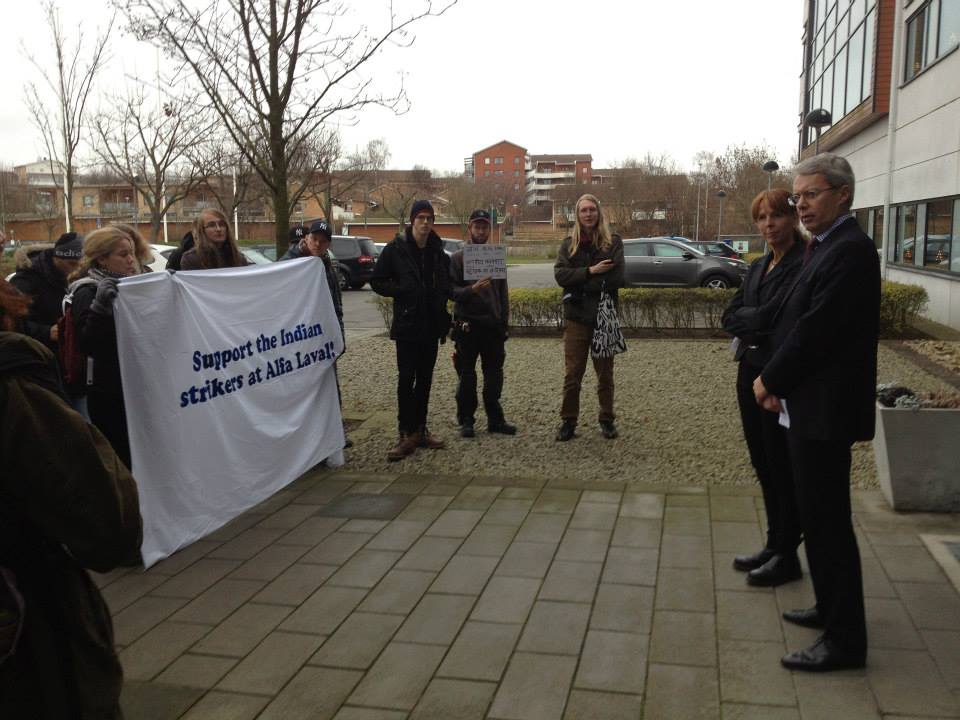
Grevdeki Alfa Laval işçilerine destek eylemleri
Alfa Laval skrev att det i nuläget bara sitter femton strejkande arbetare utanför deras fabriksgrindar. Det kändes så klart trist att höra, men förståeligt. Det är ekonomiskt mycket tungt att strejka utan ersättning och vi har förståelse för om folk letar jobb på andra ställen. Så igår skickade de strejkande dagsfärska foton. På foto här nedanför syns väl ungefär 75 av de 15 strejkande.
De sitter utanför grindarna i skift om 150. På nätterna är det ungefär halva den summan som sover där.
Foto: Stöd de strejkande arbetarna på Alfa Laval i Indien

Tidigare text från 2013-12-03
Strejk på svenska företagskoncernen Alfa Laval i Indien, företaget vägrar att förhandla med fackföreningarna.
Manifestation i Lund den 29 november utanför Alfa Lavals huvudkontor.

1. Produktionen ska flyttas till en annan fabrik 2015 och det är en av anledningarna till att de skurit ned på antalet arbetare som anställs via underleverantören Semeet Facilities, som ingår i koncernen The Sumeet Group.
2. I december förra året skedde en olycka på fabriken som innebar att en arbetare dog.
3. Övertid från 2012 har inte betalats ut till de anställda, och alltså inte heller retroaktivt till de strejkande arbetarna.
En av de strejkande skriver till en av oss om hur de nu försöker få de fastställda att stödja dem i konflikten: "Hi brother, today we spread your photos, we print copies, to the permanent workers and tell them look swedish people help us but you not. Let see what they will think about this."

December 1, 2013 a short report from Joerg Nowak
The Swedish company Alfa Laval produces heat exchangers for pharma and food industry, but also for the oil and energy sector. On their website, they say they have 28 major production units, 15 in Europe, 8 in Asia, 4 in the Us and 1 in Latin America. The company claims to have 16000 employees worldwide.
In Pune, India, 3 hours from Mumbai, Alfa Laval has a plant with 800 workers. Of these workers, 60 are permanent workers, another 250 are permanent workers under a different legal status, called junior management cadre (JMC). This category JMC is used to deprive workers the rights according to labour law. However, both of these groups are unionized under two different trade unions internal to the company. 70 contract workers are in the factory with a new contract and go on working.
The remaining 402 contract workers went on strike in October 1st, 2013. Most of them work on the production line. The contract workers have been employed in the company since a long time, some of them more than 15 years. The contract workers earn between Rs. 8 and 10000 a month. The permanent workers and JMC earn between Rs. 30-40000 a month. Most of the contract workers have been working for more than 10 years continuously, and engage in the same work as the permanent workers, but the company brought in a system of giving ‘breaks’ for 3-6 months every 280 days, so that there legal case of getting permanent is weakened. A continuous spate of harassment and terror to break the unity of the workers is acted on as a matter of policy of the management, within the factory space and through the contractors. The discontent of the workers arise from this harassment by the management, work pressure coupled with job insecurity.
The contract workers sent a letter to the management demanding to be made permanent on September 15, 2013. As there was no response to the letter, they went on strike. Due to the strike, all contract workers were dismissed and they are sitting in front of the factory gate. Between October 15 and October 20, 15 of the workers went on fast-unto-death. After six of them fainted and had to get medical treatment, they changed the tactics and went to Chakri strike: Workers don’t eat for 12 hours and then another worker comes and takes the shift of hunger strike.
The output of the company is around 30 % of the normal output due to the strike, which means they are losing a lot of money, about 16 million Euros until 21st of November since October 1st. On November 12, the Labour Commissioner ordered that the company would have to take the workers back, but the company refused and now the case is going to another court. Until now, the company refuses to negotiate with the trade union representing the contract workers.
The company announced a year ago that they want to shift the entire production to another plant in 2015, and they started diminishing the number of contract workers from 800 to 400. That was also one of the reasons for the strike. In december 2012 one worker had an accident in the factory and died. The company did not yet pay the overtime bonuses from 2012, so they might be happy that they found an opportunity to fire these workers.
The contract workers are organized in a trade union called Rashtree Shramik Agardi affiliated to the trade union of Nationalist Congress Party. The permanent workers and JMC workers have separate Unions.
The strike is not an isolated incident as 40 contract workers from a neighbouring factory close by Simmons-Marshall did the same in May/June and got regular contracts. Currently, in another city in Maharashtra, 600 contract workers in the Maharashtra University of Health Sciences in Nashik are on strike, too, for regularisation of work contracts
- See more at: http://sanhati.com/articles/8636/#sthash.fxnEGlRV.dpuf


Kommentarer
RSS-flöde för kommentarer på denna post